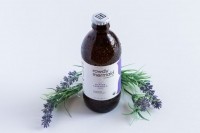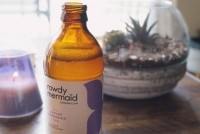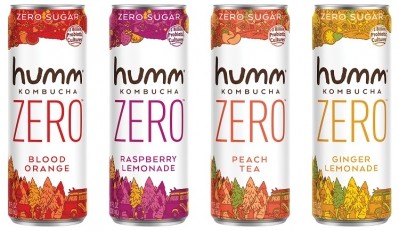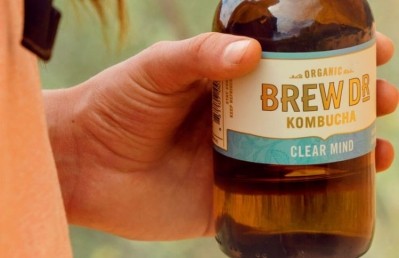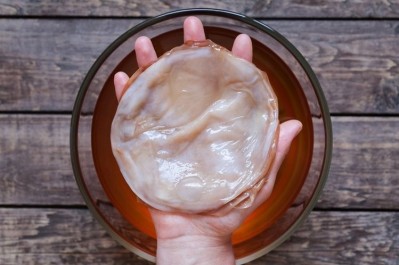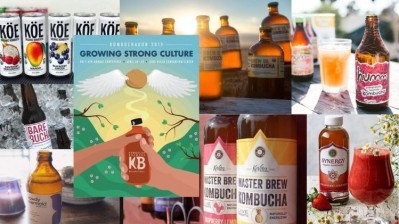Rowdy Mermaid Kombucha raises $3.5m, plans move into cans
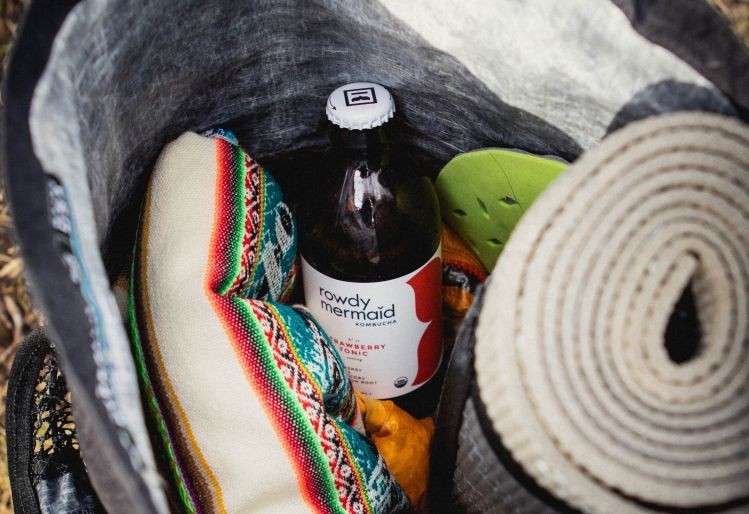
The cash injection will help the brand move into new territory and accelerate plans to switch from glass bottles to cans, a format that’s more expensive for the company to produce, but cheaper to ship, and more environmentally friendly, CEO Jamba Dunn told FoodNavigator-USA.
“The round will be used to help fund a broader western sales expansion into conventional and some on the go channels as well as foodservice.
“The interesting thing about cans is that they don’t let light into the container, so you get an increase in shelf-life, and they keep the flavor more solid for longer. We will also have the ability to make our future flavors more highly functional than they are today, by ensuring for example that our products contain glucuronic acid.
“We’re currently in around 500 locations, and we expect to at least double that over the next year, but we’re not focused on higher ACV, we’re looking to build strong relationships and grow this business in a much more organic fashion,” added Dunn, who said kombucha category sales were still growing in the double digits as consumers sought out more sophisticated beverages.
Triple-digit growth
Founded in 2013 by Dunn – who brews his kombucha with ingredients from lavender and Tasmanian pepperberry, to chaga mushrooms and turmeric – Rowdy Mermaid is generating triple-digit growth and attracting consumers who are fans of beverages such as Spindrift and tonic waters, but are also looking for more ‘elevated’ or ‘functional’ options, he said.
“75% of our audience is women, but we’re also seeing a younger audience pick it up, and we’re seeing growth in places like truckstops and c-stores that we didn’t see before. We’re also seeing foodservice customers that were in contracts with Pepsi and Coke, but are now beginning to rethink them and look at pulling in alternative beverages such as kombucha.”
Rowdy Mermaid products are available throughout the Rocky Mountain region, Colorado, Idaho, Kansas, Missouri, South Dakota, Montana, Idaho, New Mexico, Utah, Arizona, Texas, Nevada, Wyoming, and California at 500+ retail stores including Whole Foods, Natural Grocers, Gelson’s Market, and King Soopers.
‘Functional’ kombucha?
While kombucha sits in the ‘functional beverage’ set, and some brands do focus heavily on their probiotic credentials, others are now more focused on delivering more mass-market flavor profiles (more fruity, less vinegary), or going down a more culinary, artisanal route, said Dunn.
“When we first surveyed the market in 2012 the taste profiles were extremely sweet and sour, which matched what home brewers were making, and the packaging and the branding was dedicated to a specific subset of the population, so we felt there was room for a different category of kombucha which we call functional kombucha.
“But I’m not really talking about probiotics [to which the brand makes no reference on its packaging]. We’re not complete believers that the natural probiotics in kombucha are of the highest functionality, so what we’ve done is team up with an Ayurvedic herbalist and infused each SKU with different plants such as adaptogens. We don’t add flavors, we add functional ingredients that happen to taste like peaches or flowers, for example.”
Taste: ‘It doesn’t taste like anything else on the market’
As for taste, he said: “We are a kombucha with just as much acid as the others, but you can’t taste it, it’s extremely smooth and it doesn’t taste like anything else on the market.”
Asked about sugar, Rowdy Mermaid does not add extra juice, sugar, or high intensity sweeteners such as stevia to its wares post fermentation (which requires sugar and tea), he said.
“We increased our sugar levels six months ago when we switched to using organic teas, which extended the brewing timeframe, but we have been reducing sugar monthly in order to hit an appropriate level before updating our labels [which currently state 6g sugar per 6oz].
“Currently our in-house testing shows 5g per serving and our goal is to reach 4g per [6oz] serving by this summer. We will be changing the Nutrition Facts on our label to reflect this once we're confident that all of our SKUs maintain the same integrity of taste with the lower sugar recipe.
“In terms of taste, our kombucha is the driest tasting product on the shelf without much discernible sweetness.”
We control and limit alcohol to 0.3% abv throughout the shelf life
So what is Rowdy Mermaid’s approach to controlling alcohol, something that has got many kombucha companies into legal hot water in recent years (Rowdy (among others) was sued by Tortilla Factory last year but the case was tossed)?
Dunn would not go into detail over its production methods, but said: “Of all the kombucha companies’ products we’ve tested, and it’s somewhere in the neighborhood of 40, there are only two others we believe are adequately controlling their alcohol levels.
“We control and limit alcohol to 0.3% abv throughout the shelf life, and we’ve filed for a patent covering how we do that. We’re not using a process that we believe any other kombucha producers are using and we have zero issues with alcohol; there is no potential for alcohol to be produced in the bottle later on.”
(The bubbles in Rowdy Mermaid come from forced carbonation, not from a secondary fermentation process happening in the bottle, he stressed.)
‘There seems to be a strong contingent in the kombucha industry that really wants to hold onto kombucha as really what a home brewer would make’
Kombucha is typically defined as a fermented tea, whereby firms ferment sweet tea with a kombucha culture or SCOBY. Individual brands may also add herbs, fruit juice, and other ingredients, before or after the fermentation.
The devil, however, is in the detail, with some companies making a virtue of the fact that their kombucha is 'raw,’ and others heat pasteurizing their kombucha and adding in well-characterized strains of probiotics afterwards, for example. Some firms use micro-filtration techniques to filter out some yeast, while others distill off some alcohol post fermentation.
‘We are still fermenting tea, but we are doing it in a much more rigorously controlled scientific way’
Dunn added: “There seems to be a strong contingent in the kombucha industry that really wants to hold onto kombucha as really what a home brewer would make, and in our estimation, that is not a view that will allow this industry to grow.
“They would like everyone to grow kombucha using these old SCOBYs and that’s great, but it’s not going to solve the problems of alcohol and sugar and consistency over time. Bacterial strains will change their DNA in a 24-48-hour period in order to consume different types of sugars and compete with other strains in the same batch, and that could drastically change the outcomes you’re looking for from a flavor and an alcohol standpoint.
“Better controlling yeast and bacterial strains over time is critical, so we look at the metabolites created by the yeasts and bacteria in a batch to understand what’s in a healthy culture. We are still fermenting tea, but we are doing it in a much more rigorously controlled scientific way.”
Alcohol testing: Rowdy Mermaid CEO Jamba Dunn, told us in 2018: "We control ethanol throughout the process to ensure we are in line with federal FDA and TTB compliance, which requires the product to remain below .5% throughout the entire life of the product.
"We also work with two local laboratories to ensure the security of our tests at a monthly interval, and we work with a national laboratory to provide an additional layer of regulatory assurance. We have a contractual agreement with the manufacturer of our ethanol testing equipment to calibrate and check our equipment against at least one additional testing protocol to map any deviations in the equipment against the multiple layers of testing as the tolerances of variance are extremely narrow. We have been random tested by the FDA as well as by third party auditory agencies.
"As vocal advocates of genetic testing, we are building an in-house genetic bench to better understand the conditions under which bacterial strains mutate their DNA. Earlier this year, we took part in a project to genetically test our product and build a library of genetic snapshots to map transitions in yeast and bacteria and metabolites, as well as their effect on the respiration of mitochondria affecting ethanol production."
